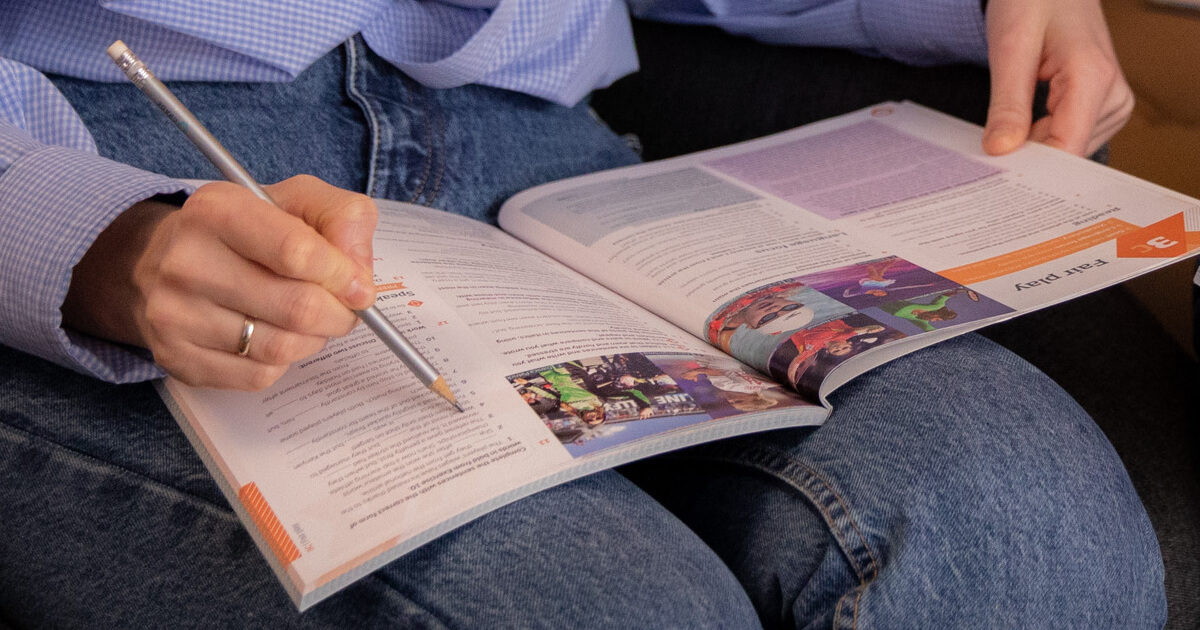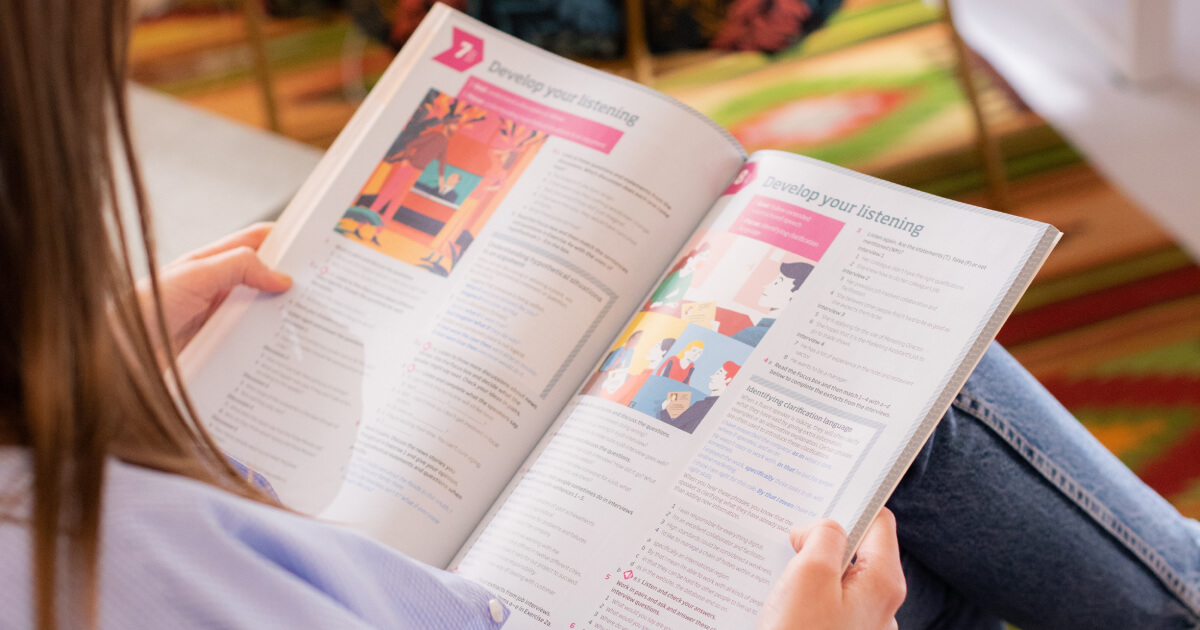
Planning for the Unexpected: Navigating Disruptions in Online ESL Lessons
- Tips & Strategies
- Methodology

09.01.2024
If you are reading these lines, congratulations because you decided to take the CELTA course. Or do you still have doubts about training? We understand that you want it, and it scares you at the same time. But we are here to help!
Our experienced CELTA trainers know how to avoid sharp corners and can share really effective tips. We asked them to tell our future CELTA trainees how and what to do when the CELTA interview and the whole enrollment process is behind.
Everything you need to know about CELTA
Both full-time and part-time CELTA courses require concentration and time before, during, and even after the course itself.
Here are some useful tips on what you should do before starting the CELTA.
Ask your boss to reduce your workload.
Limit the number of your classes if you’re a private tutor. If you decide to do a full-time intensive course, stop working altogether for a month.
Helen Taranenko, a CELTA trainer, says,
‘It seems obvious but my experience shows that there are always trainees who struggle, who are stressed and exhausted because they underestimated the CELTA. The course is challenging but such fun if you are able to focus on it.’
Therefore, make sure you are not distracted by countless working tasks and do not postpone completing your CELTA tasks until the last minute because you simply have no time for focused studying.

Make your first steps in ESL teaching
Facilitate learning with usIt’s no surprise that CELTA candidates aim at getting a certificate with higher grades.
However, CELTA it’s not an exam, it’s a very short period when you have a chance to learn a great deal of new information, improve your teaching skills and develop a large number of new ones.
‘Focusing on learning and development should be the main priority during the course. You will only teach 8 lessons, which doesn’t seem enough to improve a lot. Well, I have seen so many trainees who managed to change their way of teaching so dramatically that it looked like a miracle’,
Eleonora Pazyak says.
Thinking about getting As and Bs will add more stress and challenge. Any mistake will seem to be pushing you away from your success.
However, a real success during the course is about becoming a better teacher.
Whatever happens during the course: you teach a great lesson, or something doesn’t go the way you expected, is developmental, any mistake is the opportunity to learn and improve.

Chris Reese says,
‘When I start planning a lesson together with a trainee, one of the first questions which I usually ask them is “What is our main aim?”. They can usually identify this well-enough – but then, as soon as they start really planning the lesson, they forget all about their aims and start thinking about fun activities or their own explanations’.
How to avoid this, Chris tells in the following video:
Meanwhile, we are going to discuss the recommendations you’d better follow once you start your course.
As soon as you turn your aims and goals into the main focus, CELTA (and teaching in general) gets a bit easier.
Very often, we plan some activities in our lessons because we like them, and because we think students will find them engaging. However, do the activities we like always help achieve your lesson aims?
For example, you are teaching a grammar lesson, second conditional. You use coursebook materials and do your presentation as mentioned there. After that, you play Beyoncé’s If I Were a Boy song and use it to present the second conditional one more time. Why? The answer is ‘because my students like singing, and because it is interesting.’
On the other hand, you have introduced the same grammar exponent twice, which means you have wasted the precious time your students could have spent practicing.
I seriously doubt that after such a lengthy presentation your learners will get to freer practice, which is of paramount importance in any language lesson since it enables the learners to really use the grammar or vocabulary in their language.
Discover some perfect ESL songs
When you plan your lesson, everything you do has to contribute to the achievement of the aims.
If you cannot answer the questions, ‘Why do I need this in my lesson? How does this task help achieve my lesson aims?’, this activity is irrelevant.
Planning lessons is an important part of the CELTA course.
When you have thought about each and every detail, teaching gets easier and you radiate confidence.
But do we plan to teach the plan, or are students more important? Of course, planning is necessary but students with their needs are a priority.
We teach the students, not just the plan.

A good way is to look at the lesson from the students’ perspective.
But what does it mean and how to do this? How to understand what might go wrong with tasks? Time? What problems might students experience and how to fix them?
Start planning by doing the tasks that your students will do in the lesson.
This basically means that you put on a student’s hat and go through tasks by answering all the questions, and filling in all the gaps. And without peeping into the keys!
While doing it, you might notice where students need some more explanation, or maybe more time to complete a task.
What might be troublesome and how to make things easier for your students.
They often ask tricky questions in the lesson.
Doing tasks yourself first will allow you to anticipate these questions and think about a good answer well in advance.
So, equip yourself with the powerful tool of being first a student and then a teacher.
What are the typical problems in an ESL class?
A lot of teachers have problems with timing, and they don’t understand why they never have time to cover everything they have planned or enough time for proper practice of grammar and vocabulary.
How can we avoid this problem? There are several points to consider.
You need to know exactly what your lesson aim is and build your lesson around the most important stages.
The most important stage in grammar and vocabulary lessons is freer practice. If you never get to it when you are teaching, you deprive your learners of immediately using the new grammar structure or vocabulary in a real-life situation, and if you don’t practice properly, you don’t learn.

Therefore, you have to plan backwards.
Think of the speaking task you want your students to be able to do successfully using the new language properly.
Then think of your presentation that will help students understand meaning, form, and pronunciation of the new language.
Think of the speaking task you want your students to be able to do successfully using the new language properly.
Then think of your presentation that will help students understand meaning, form, and pronunciation of the new language.
Plan proper controlled practice to help students practice the meaning and form of the new language in restricted conditions.
Think of a short but engaging lead-in that sets up the topic of your lesson and helps raise students’ interest. Make sure that everything you have planned helps students produce during the freer practice task.
Remember what really helps students practice and remember a new language, and prioritise these stages and activities in your lesson planning and preparation.
What do we teach when we teach speaking?
When planning lessons, it is not enough to think only about what you are going to do and what students will do.
We must always be prepared for the fact that something may go wrong rather than wondering whether we are going to face any challenges or not. In fact, everything may go wrong.
Here the word ‘challenges’ may mean absolutely anything: starting with latecomers or files that can’t be opened and ending with a sudden absence of the connection or students avoiding the target language.
The bottom line here is the following: you should take anticipated problems seriously.
And here is Chris Reese, elaborating on this in more detail:
There’s definitely a lot to do on the CELTA course. Drafting a detailed lesson plan, analysing language to teach, and preparing materials takes a minimum of 3 hours for one lesson.
You will also be attending input sessions and completing extended written tasks, all of which take quite a while.
So how do you manage the course then?
Where is the best place to take CELTA?
The most important thing is to prioritise what you do and plan your time.
First of all, plan time to work and study as well as allow some good time to rest.
Recharging batteries is essential as tiredness accumulates and it becomes more and more difficult to complete seemingly easy tasks.
Recharging batteries is essential as tiredness accumulates and it becomes more and more difficult to complete seemingly easy tasks.
‘Sleeping is a necessary luxury’ as we say on the CELTA course, especially before the teaching day.
Prepare by bits. If you do this an evening before the important day, a sleepless night is guaranteed, and teaching a lesson with low energy is extremely challenging and not really effective.
So plan your time wisely and enjoy yourself on the CELTA course!

During the course you will be doing a lot of writing: lesson plans, language analysis, and of course written assignments.
There will be 4 of them. Sounds like a lot of work, but don’t panic. You are going to have a lot of help from your tutors.
You are going to have the setting up sessions when your tutor will familiarise you with how to do each assignment and special Q&A sessions when you will have a chance to clarify everything before submitting your work.
‘Well, since you will be dealing with a lot of different information, I really recommend reading the rubrics/instructions before setting up sessions and underlining the key information. I also recommend putting question marks on the margins if you don’t understand something. This will help you understand the tutor’s instructions better, focus on unclear parts and ask questions if you still have them at the end of the session’,
Eleonora Pazyak says.
Start working on your written assignment before the questions and answer session so that you can clarify everything that might become unclear in the process of writing.
Please, don’t get upset if you need to resubmit it; it’s not a failure. It’s just another chance to improve your work and usually, these are just a few things that you need to fix.
Read your tutor’s comments very attentively and ask questions if something is still unclear. Remember that the tutors are always there to help.
How to give constructive feedback?
You definitely have to be aware of all the challenges that are waiting for you. Among them is constructive criticism, which is still so hard to swallow.
However, deciding to join your first CELTA training means remembering the very nature of learning. It’s OK to not be able to do something or do something wrong. It can easily be changed as one starts to be open to recommendations and changes.
So, the final tip: be open to changes.
How? Find out in the video:
Is it essential to make your workload smaller before starting CELTA?
Arina Kravchenko
Author
Teacher of General English & IELTS
Yulia Chorna
Author
Product Manager at Grade University | Experienced Educator in General, Business English & Exam Prep | ELT Conference Organiser | Speaker at TESOL & IATEFL Conferences | Passionate About Teacher Development & Educational Innovation
Comments
Leave your comment